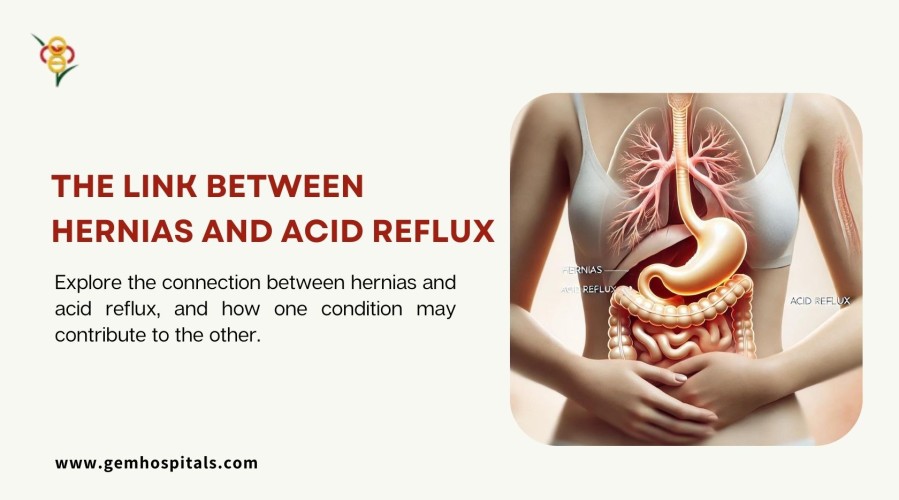Learn effective solutions for digestive problems with expert tips to improve gut health, reduce discomfort, and maintain a healthy digestive system.
The Link Between Hernias and Acid Reflux

Hernia and acid reflux are two different medical conditions that are related to the abdomen region, both of these conditions going to cause a certain level of discomfort. Even though they are two distinct conditions they are interrelated, especially in the case of hiatal hernia. Here you have to understand the connection between the hernia and acid reflux which helps you manage the symptoms effectively and also be able to get appropriate treatments. Continue reading the below content to make yourself aware of how hernias and acid reflux are linked.
What is a hernia?
Hernia is one of the common conditions the majority of people are living with them worldwide. It is due to protrusion of any of the tissues or organs through the weaker spot around the surround of the abdomen. There are several types of hernia like inguinal, umbilical, and incisional but one among them has interconnection with acid reflux it is a hiatal hernia.
A hiatal hernia usually occurs when the part of your stomach pushes via the diaphragm to the chest cavity. The diaphragm is a muscle that separates the abdomen from the chest, and it helps keep the stomach and its contents in place. When a hiatal hernia occurs, the opening in the diaphragm becomes enlarged, allowing the upper part of the stomach to move into the chest.
What is acid reflux?
Acid reflux is a condition that often occurs when the stomach acid or bile juice that is poured into the esophagus region. They are also called gastroesophageal reflux. The backflow of these fluids irritates the esophageal area and makes you feel like heartburn, chest pain, and regurgitation of food or sour liquid.
When acid reflux occurs frequently, it can develop into a more severe condition called gastroesophageal reflux disease can lead to complications like esophagitis and an increased risk of esophageal cancer.
How are hernias and acid reflux connected?
The link between the hiatal hernias and acid reflux is significant. Generally, this type of hernia is going to disturb the normal function of the esophagus pipe which is a valve between the esophagus and the stomach. The lower esophageal sphincter usually prevents the backflow of the food that entered the stomach region, in this case when this hernia is present that case weakens the lower esophageal sphincter and makes the way for acid to escape to the esophagus.
Symptoms of hiatal hernia and acid reflux
The symptoms of a hiatal hernia and acid reflux overlap most of the time, thus the proper recognition indicates the type of condition you are undergoing.
- Heartburn
- Regurgitation
- Chest Pain
- Difficulty Swallowing
- Chronic cough
- Hoarseness
- Nausea
Remember not everyone with a hiatal hernia going to experience acid reflux, and similarly not everyone with acid reflux will have a hiatal hernia. However, when there is pressure the hiatal hernia can increase the likelihood of experiencing reflux symptoms.
Diagnosing hernias and acid reflux
If you are experiencing symptoms of acid reflux or suspect you might have a hiatal hernia, it’s essential to seek medical advice. A healthcare provider may use several diagnostic tools to confirm the presence of a hiatal hernia and assess the severity of acid reflux:
Managing hiatal hernias and acid reflux
Treatment for a hiatal hernia and acid reflux typically focuses on relieving symptoms and preventing complications. Here are some strategies for managing both conditions:
Lifestyle changes
Avoid trigger foods such as spicy foods, citrus fruits, chocolate, caffeine, and fatty or fried foods. Eating smaller, more frequent meals can also help reduce symptoms. Maintaining a healthy weight can reduce pressure on the abdomen, decreasing the risk of acid reflux. Raising the head of your bed by 6 to 8 inches can help prevent acid from flowing back into the esophagus while you sleep. Wait at least two to three hours after eating before lying down or going to bed.
Medications
Over-the-counter antacids can provide quick relief from heartburn by neutralizing stomach acid. Medications like ranitidine or famotidine reduce the production of stomach acid and provide longer-lasting relief.
Through the above content, you would have got to know about the link between the hiatal hernias, and acid reflux. On finding the difficulties and pain in the abdomen region consult a healthcare professional for quick results, prefer the best hospital, and get enough support in rectifying your issues.
If you're experiencing symptoms of a hernia don’t wait. Contact GEM Hospital today to schedule an appointment.
Blogs & Article
Explore current research trends in digestive health, including new treatments, advanced diagnostics, and innovations improving gut health and patient care.
Discover common digestive health myths and the real facts. Learn simple tips to improve gut health and maintain better digestion for a healthier life.


